What Is CPAP Battery Backup
CPAP machines are critical devices for people with sleep apnea. But rolling thunderstorms, blowing blizzards, and knocking down power lines make power outages an inevitable part of life. If you don’t have a reliable CPAP battery backup system, you’ll be left without your machine during such unplanned events. Jackery Explorer Portable Power Stations are portable CPAP charging solutions, so you never have to skip CPAP treatment.
Whether you are planning an RV trip or you want to prepare yourself for unexpected power outages, portable power stations can act as stable CPAP battery backup systems. In this guide, we will reveal what CPAP battery backup is, the types of CPAP machines, and the best battery backup for CPAP machines. We will also reveal the important factors to keep in mind when choosing the best battery backup for CPAP.
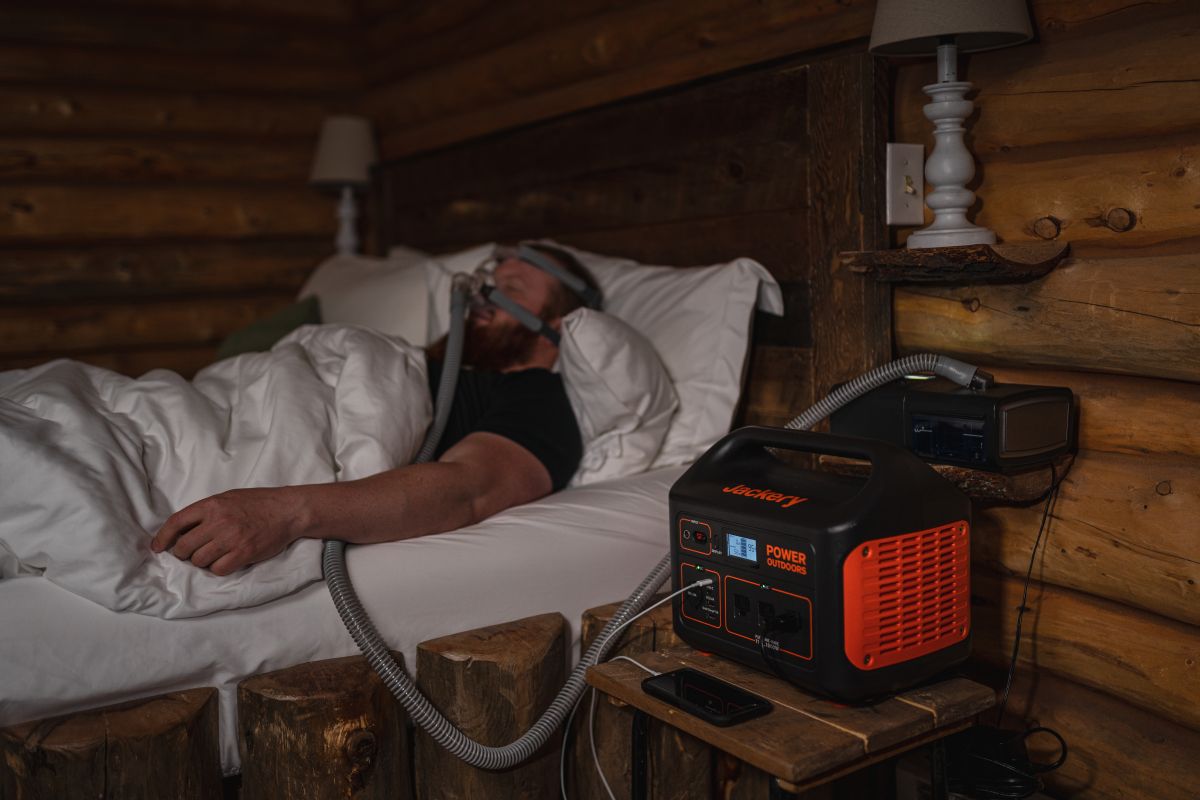
Types Of CPAP Machines
While choosing the best battery backup for CPAP, it’s vital to understand its type and model. Below we include some common types of CPAP machines available in the market.
Standard CPAP Machines: CPAP or Continuous Positive Airway Pressure is the most common machine type for PAP therapy. On average, it consumes around 30-60 watts of power at a moderate setting of 7-12 cm H2O.
APAP Machines: Also known as Auto-CPAP machines, the auto-adjusting positive airway pressure can be comfortable for sleepers with fluctuating breathing levels. The airflow of the devices changes based on changing breathing patterns.
BiPAP Machines: Bilevel Positive Airway Pressure (BiPAP or BPAP) machines feature two pressure settings. Users can switch between high and low pressure during inhaling and exhaling, respectively.
Travel CPAP Machines: As the name defines, these portable, small, and lightweight machines are perfect for traveling. Compared to other types of CPAP machines, they consume less power. You can pick a CPAP travel battery to charge the device when you’re enjoying out in the woods.
Generally, most CPAP machines draw anywhere between 30W and 60W per hour. If you are using the CPAP for 8 hours, the total watt-hour consumption of CPAP machines will be 240Wh - 480Wh.
Based on the type of your CPAP machine, you can easily purchase the battery backup that fits your needs and preferences.
How Does Jackery Work as CPAP Battery Backup?
Jackery offers various portable power stations to charge different CPAP machines. Jackery Explorer Portable Power Stations supply steady power to the machines, especially when the power grid is down or you enjoy outdoor activities. The rechargeable battery-powered generator features multiple AC outlets, a DC carport, and USB charging ports to charge multiple devices simultaneously.
One of the best features of Jackery Explorer Portable Power Stations is the multiple charging options available. You can charge the battery using Jackery SolarSaga Solar Panels, a car outlet, or wall charging. Simply connect one end of the charging cable to the SolarSaga Solar Panels, car, or wall port and the other end to the power station to start charging it.
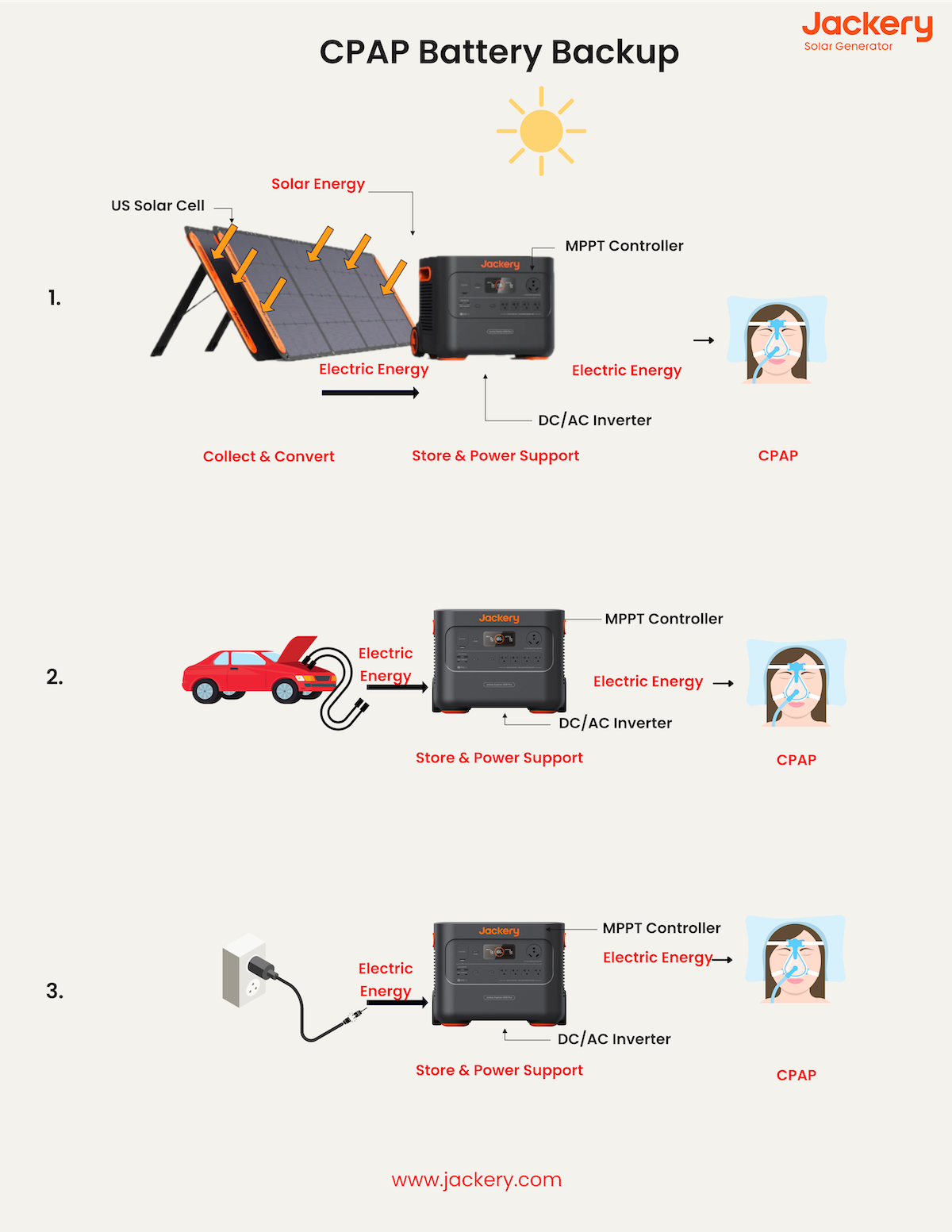
Some of the primary benefits of using a portable power station as a CPAP battery backup system include the following:
- They are light in design and portable, making them an ideal solar charging solution for those who prefer frequent traveling.
- Not only CPAP machines but a powerful power station can also charge other outdoor devices such as smartphones, laptops, or tablets.
- Built with durable materials, Jackery Portable Power Stations can withstand harsh weather during hiking or camping.
- When you have a reliable power source by your side, you can prepare yourself for power outages or other events.
Best Battery Backup For CPAP Machines
For a person using a CPAP machine, enjoying camping or hiking seems like a hassle. That’s where the best power station for CPAP machines comes into the picture. First, however, you’ll need to check the watts your CPAP machines use and compare it with the battery backup capacity.
CPAP Watts
Most CPAP machines require 30-60 watts of power, depending on their type and model. That means the machine will use around 240 to 480 Wh, assuming you use a CPAP machine for 8 hours per night.
However, if you are using a heated humidifier in high-pressure settings, the machine will consume nearly 70 to 100 watts of power. The most efficient type is the travel CPAP machine, that usually consumes 5 to 20 watts of power.
Power Outage CPAP Battery Backup - Jackery Explorer 2000 Plus Portable Power Station
The Jackery Explorer 2000 Plus Portable Power Station is a reliable charging solution for powering appliances like CPAP machines during long-term power outages and blackouts. The outstanding LiFePO4 battery has a long battery lifespan of 10 years. For example, a CPAP machine drawing 30 - 60 watts per hour of electricity can be charged for nearly 30H - 58H. With this CPAP power bank, you can rest assured most of your essential devices remain powered for hours.
Appliances running time:
- CPAP Machine (60W) = 19.7H
- Portable AC (1000W) = 1.6H
- Refrigerator (850W) = 1.9H
- Electric Grill (1700W) = 1.0H
- Electric Oven (800W) = 2.0H
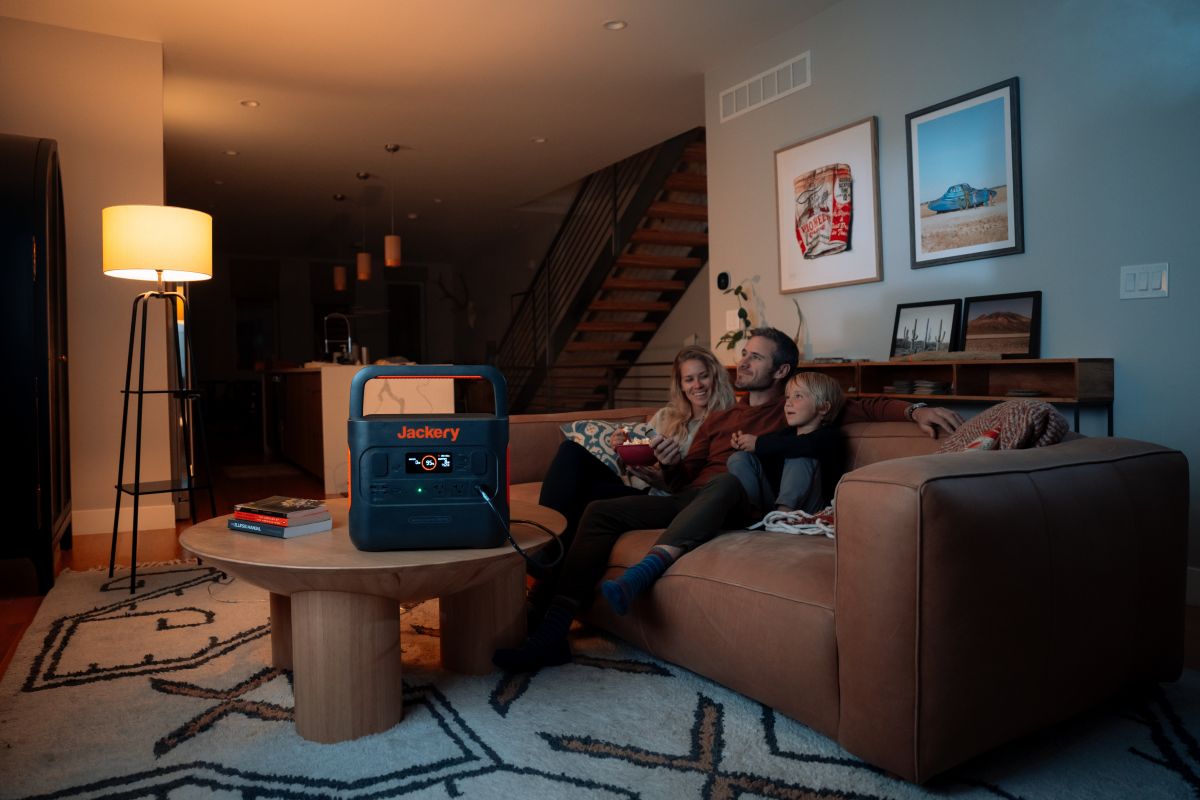
Customer Review
“I purchased this to give my husband and I peace of mind during what has become more frequent power outages in our home. My husband uses an oxygen concentrator at night. The unit quickly charged up, and testing has shown it will power the concentrator for 7.1 hours, which will get him through the night in an emergency.” — Judy Browne.
CPAP Battery for Camping - Jackery Explorer 1000 Plus Portable Power Station
If you want to go on camping trips but are worried about how to run a CPAP without power, then the Jackery Explorer 1000 Plus Portable Power Station might be a great choice. It's one of the best Jackery for CPAP machines, weighs only 14.5 kg, and has a foldable handle so you can carry the portable power station anywhere you like. One important thing to note is that the CPAP battery for camping operates by emitting less than 30dB of noise, making it reliable and efficient for use at night time. You can also charge 99% of your campsite appliances, making the power station an ideal choice for outdoor adventures.
Appliances running time:
- CPAP Machine (60W) = 13.6H
- Portable AC (1000W) = 1.0H
- Refrigerator (850W) = 1.2H
- Kettle (850W) = 1.2H
- Electric Oven (800W) = 1.3H
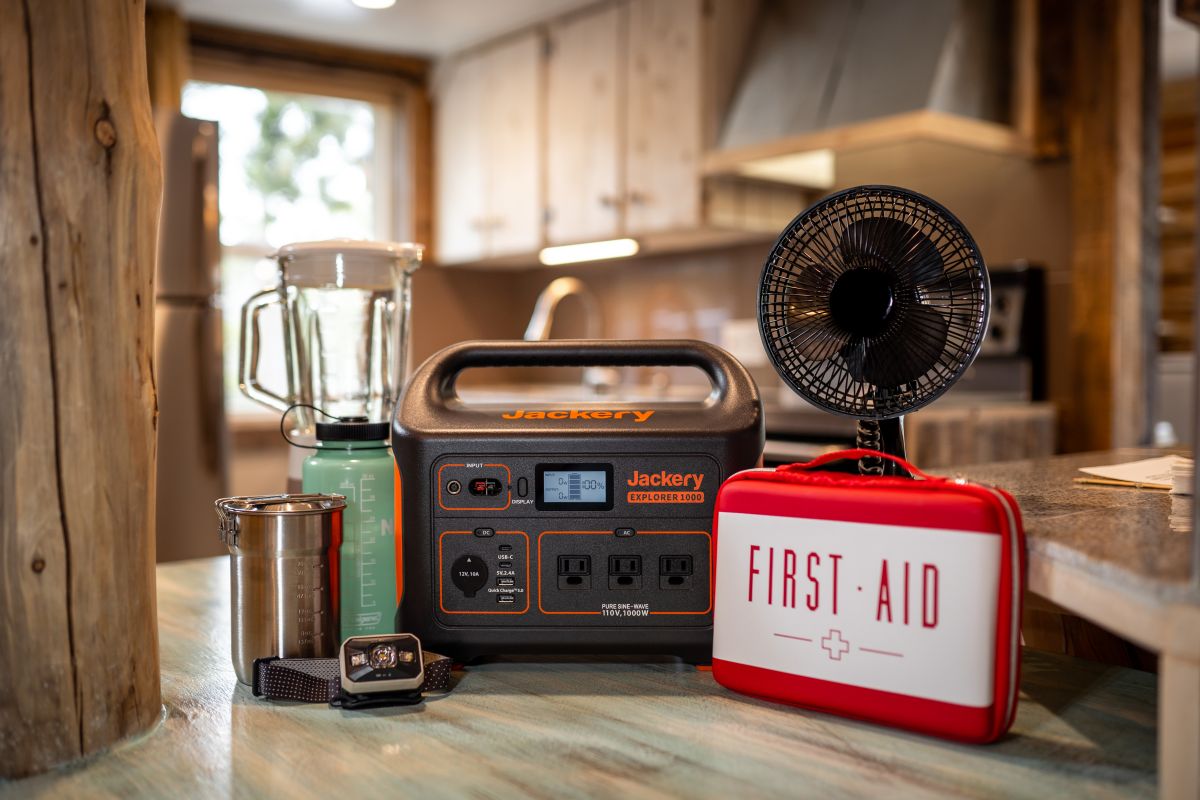
Customer Review
“If you enjoy the outdoors but can't live without your gadgets, then you need something like this. I already have a 3000pro, so I didn't purchase the extra battery pack for this unit. Charging is quick using AC or 4 Solar Saga 200s. Took this unit out on the weekend, and it performed as expected.” — Chris.
CPAP Generator - Jackery Solar Generator 1000 v2
The Jackery Solar Generator 1000 v2 is one of the best generators for CPAP machines that can charge essential home or outdoor appliances like CPAP machines, refrigerators, portable coolers, etc. The Jackery Explorer 1000 Plus v2 Portable Power Station weighs only 24.2 pounds and has a compact foldable handle. It is more portable and lighter compared to similar capacity products so you can fit into the rear compartments of the vehicle. You can also use this CPAP generator during unexpected power outages or blackouts.
Appliances running time:
- CPAP Machine (60W) = 11.7H
- Portable AC (1000W) = 0.9H
- Refrigerator (850W) = 1.0H
- Kettle (850W) = 1.0H
- Electric Oven (800W) = 1.1H

Portable Power Station for CPAP - Jackery Explorer 500 Portable Power Station
The Jackery Explorer 500 Portable Power Station is a lightweight power solution that can keep your CPAP machine charged for long hours. It weighs only 13.32 lbs and can be an ideal power solution for outdoor adventures. It emits around 37.9 dB of noise (which is less than refrigerator's hum) while charging, so you can charge CPAP at night without disturbing your sleep. The portable outlet battery is durable and can withstand both hot and cold temperatures. If you're wondering how long a Jackery 500 runs a CPAP (30W), it is 14.6 hours.
Appliances running time:
- CPAP Machine (60W) = 6.1H
- TV (60W) = 6.1H
- Blender (300W) = 1.4H
- Portable Refrigerator (400W) = 1.0H
- Mobile Phone (20W) = 14.2H
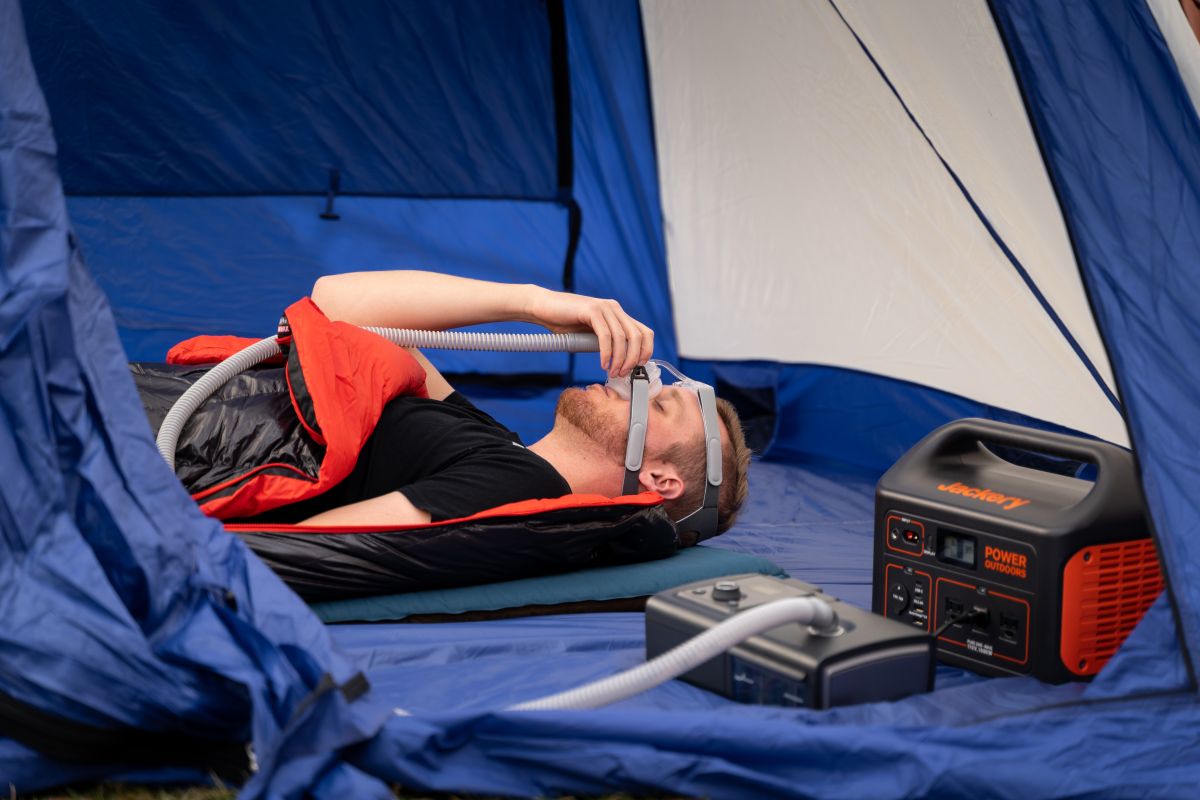
Customer Review
“Purchased to run CPAP in case of a power outage. I don’t use the dehumidifier on my CPAP, and the 500 will run my CPAP for 3 nights on one charge. Very pleased with the purchase.” – Mark Rodgers.
|
Series |
Capacity |
Output Ports |
Average CPAP Watts |
Running Time |
Running Sound (dB) 1 Meter away |
|
Jackery Explorer 2000 Plus Portable Power Station |
2042.8 Wh |
AC Output (×4) 120V~ 60Hz, 20A Max AC Output (×1) 120V~ 60Hz, 25A Max, AC Total Output USB-A Output (x2): Quick Charge 3.0, 18W Max USB-C Output (x2): 100W Max, (5V, 9V, 12V, 15V, 20V up to 5A) Car Port (x1): 12V⎓10A |
30 - 60 watts |
19.7 - 30.5 hours |
Less than 30dB |
|
Jackery Explorer 1000 Plus Portable Power Station |
1264.64 Wh |
AC Output (x3): 120V~60Hz, 2000W (4000W Peak) USB-A Output(x2): 18W Max, 5-5V⎓3A USB-C Output (x2): 100W Max, (5V, 9V, 12V, 15V, 20V up to 5A) Car Port(x1): 12V⎓10A |
30 - 60 watts |
13.6 - 22 hours |
Less than 30dB |
|
Jackery Solar Generator 1000 v2 |
1070Wh |
AC Output (x3): 120V ~ 60Hz USB-A Output (x1): 18W Max 5-6V⎓3A, 6-9V⎓2A, 9-12V⎓1.5A Car Port (x1): 12V⎓10A USB-C1 Output: 30W Max 5V⎓3A, 9V⎓3A, 12V⎓2.5A, 15V⎓2A, 20V⎓1.5A USB-C2 Output: 100W Max 5V⎓3A, 9V⎓3A, 12V⎓3A, 15V⎓3A, 20V⎓5A |
30 - 60 watts |
11.7 - 19.5 hours |
Less than 30dB |
|
Jackery Explorer 500 Portable Power Station |
518Wh |
AC Output: 110VAC, 60Hz, 500W (1000W Surge) USB-A Output: 5V, 2.4A Car Output:12V, 10A DC Output:12V, 7A (6.5mm*1.4mm) |
30 - 60 watts |
6.1 - 10.6 hours |
Less than 46 dB |
How To Choose The Best Battery Backup For CPAP?
With so many CPAP machines in the market, it can be challenging to pick the best battery backup for CPAP power outage that meets your needs. However, analyzing a few factors beforehand can help you choose the best CPAP battery backup ResMed devices.
Most importantly, you need to check the lifespan and compatibility of the battery with your CPAP machine. Furthermore, you’ll need to ensure the battery for CPAP machine is portable enough for outdoor activities.
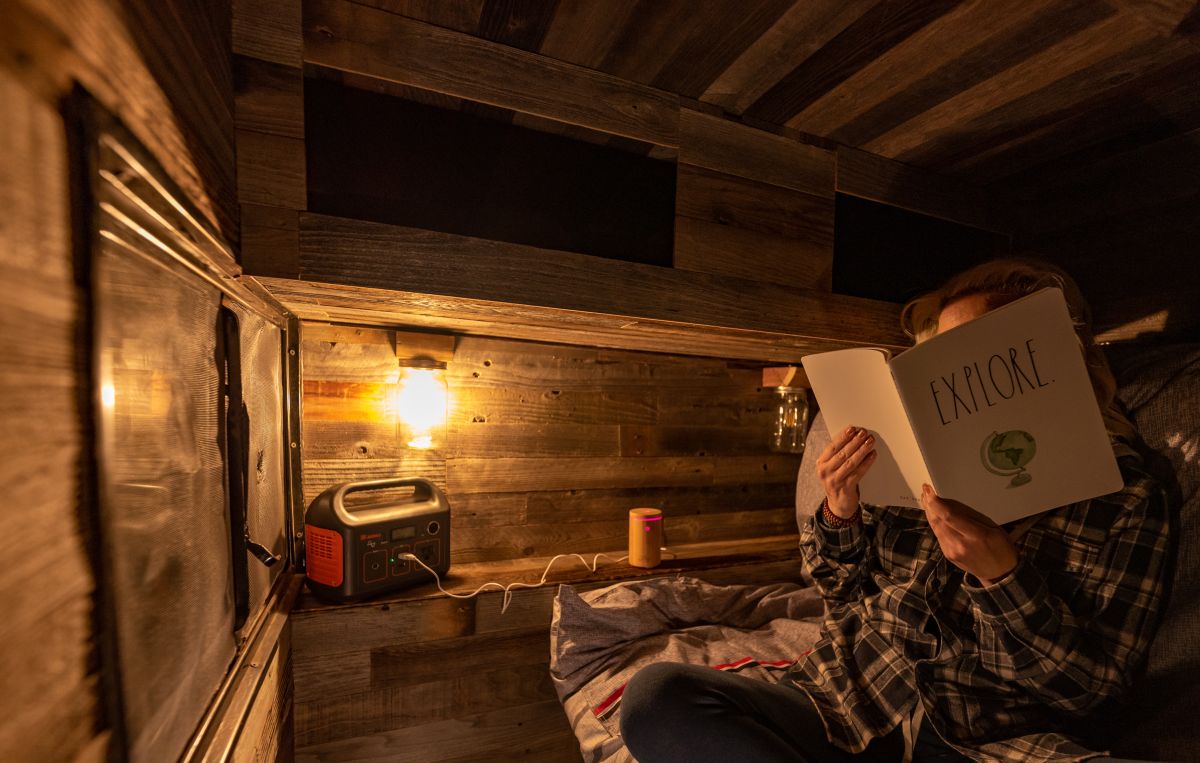
Here are a few crucial factors one must consider while selecting the robust CPAP machine battery backup system.
Capacity
The capacity of the CPAP battery is one of the most critical factors one must consider while buying it. Capacity will determine how long the power station can supply electricity and charge your appliance. As a general rule of thumb, sleepers should always purchase a battery backup with a high capacity if they have a high-flow CPAP machine.
On the contrary, a standard battery backup can efficiently support machines that consume less power. Jackery Explorer Portable Power Stations feature a large battery capacity, ensuring you can charge your CPAP machines for the whole night or multiple nights, depending on the capacity, if there is a power outage.
Safe
Gas generators can supply power to the CPAP machines using fossil fuels. However, they emit harmful gases, making them unsafe for indoor use. Further, conveniently moving the power stations from one place to another can be a significant hassle.
Unlike gas generators, solar power stations or solar generators are safe. This is because the power stations powered using solar panels use free and renewable solar energy to charge the CPAP machines without emitting toxins or harmful gases. In addition, they are compact in size, making them suitable for small spaces like RVs.
Quiet
Many CPAP machine battery backups available can be noisy, which can disrupt your sleep. Therefore it’s crucial to choose a battery that emits little to no noise while operating. For this, you’ll need to check the decibel rating of the battery.
Always select the battery backup with a dB value of 60 to less. That means the battery backup will be quieter than a whisper, so you can sleep peacefully with a running CPAP machine.
Input/Output Ports
The next important thing you need to consider is the number of ports. A CPAP battery backup will ensure that you can power various devices at the same time. This becomes more critical if you are planning to travel where you will have many outdoor devices but no nearby electrical outlet.
Jackery Explorer Portable Power Stations come with multiple input and output ports. You can charge the devices simultaneously by plugging them into different ports. In addition, the pass-through charging feature in Jackery power stations allows you to charge devices while the power station is plugged in for charging.
Weight
Some CPAP battery backups can be heavy, making it hard to carry them from one place to another. Those planning to travel CPAP with battery backup will want to choose one that is lightweight and portable.
In addition, you will need to ensure the battery capacity is not compromised while finding a portable power station. If you are finding it challenging to choose a charging solution that is lightweight yet powerful, consider compact and lightweight power stations with sturdy handles from Jackery. You can easily carry them anywhere and enjoy the free electricity.
Price
Power supply for CPAP are available in different sizes and prices. Therefore, it’s essential to always set a budget before you start looking for the best battery backup for CPAP.
The trick, however, is to ensure you are not compromising on the quality and choosing a cheap quality power generator. Instead of investing money in less expensive batteries with shorter run times and longer charge times, pick a battery built with industry-grade materials that can last long.
Long Battery Life
Some battery backups can last a few hours, while others last for days after a single recharge. A simple way to measure the battery life of power stations is by understanding the amp-hours and watt-hours of the battery. If you want to charge high-power-consuming CPAP machines, make sure you choose a large-capacity battery with long life.
Jackery Explorer Portable Power Stations are a great charging solution for CPAP users. They are safe, affordable, lightweight battery backup systems with long life. Depending on the power consumption of CPAP, you can choose the right size Jackery Solar Generator.
FAQs About CPAP Battery Backup
How much power does a CPAP use in 8 hours?
A CPAP machine draws around 30 watts per hour. If you want to calculate the energy consumption, multiply the wattage with the number of hours you are using the CPAP machine. A 30W CPAP machine will consume around 240Wh in 8 hours.
What is the best battery backup for CPAP?
The Jackery Explorer 1000 v2 Portable Power Station is one of the best battery backups for CPAP machines. It can charge the CPAP machine (30W) for 30 hours, so you can get an uninterrupted power supply during the night.
What is the best CPAP battery for camping?
The Jackery Explorer 500 Portable Power Station is a great choice for traveling, especially in remote locations when you don't have access to a power outlet. With the portable power station, you can charge the CPAP machine (30W) for 10.6 hours.
How big a battery backup do I need for a CPAP?
Most CPAP machines require between 30-60 watts of power. If you want to power a 60 watts CPAP machine for one night (7-8 hours), consider choosing Jackery Solar Generator 500.
Alternatively, if you want to power a CPAP machine and other home or outdoor devices, you can choose Jackery Solar Generator 2000 Plus. With a battery power capacity of 2042Wh, it is capable of charging a 60-watt power-consuming device for nearly 20 hours.
How do I use my CPAP without electricity?
The best way to use your CPAP machine without power or electricity is by investing in a battery backup system like Jackery Solar Generator. A fully-charged CPAP battery can charge your device for long hours, so you can sleep peacefully.
Can I run my CPAP on a battery?
Yes. You can power your CPAP machine using an external battery. Jackery Explorer Portable Power Stations are perfect for travelers to charge their appliances on the go or during power outages. They are safe charging solutions that provide a continuous and steady flow of electricity to power-sensitive devices without damaging them.
Conclusion
Sleep apnea does not mean you have to let go of your outdoor activities. Nor does it mean you have to skip sleep treatment because of unplanned brownouts or blackouts in your location. With a CPAP battery backup, you can get uninterrupted sleep apnea therapy and rest peacefully without power.
If you lose power at home or need CPAP on camping, the Jackery Portable Power Stations can help you keep your machine running for hours. They are lightweight and compact so you can easily transport to any location or store until you need them.






































































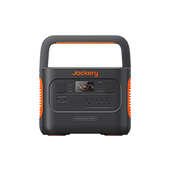

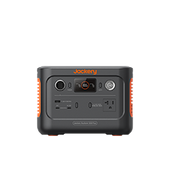












































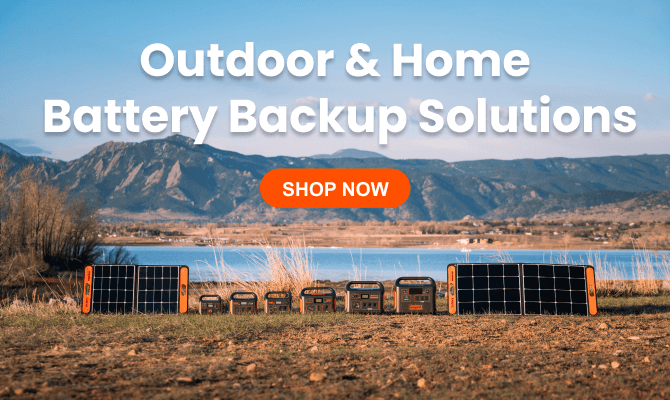
Leave a comment